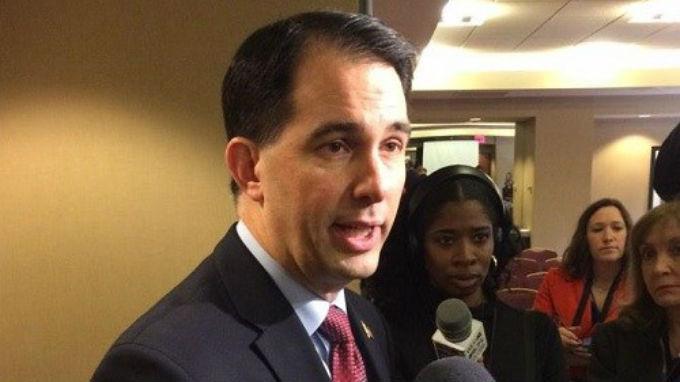Governor Walker's approval rating drops to 37% according to Marquette Poll

Governor Scott Walker’s job approval is at 37% with 59% disapproval among Wisconsin voters following his presidential bid, according to a new Marquette Law School Poll.
In August, 39% approved and 57% disapproved.
The poll was conducted from September 24 to 28. The full sample includes 803 registered voters interviewed by cell phone and by landline, with a margin of error of +/-4.1 percentage points.
Thirty-five percent say they would like to see Walker seek a third term as governor in 2018 while 62% would not. Support among Republican voters for a third-term bid is 79%.
With Walker out of the race, Donald Trump has moved into first place among Wisconsin Republican voters, with 20% support, followed by Ben Carson at 16%, Marco Rubio at 14% and Carly Fiorina at 11%. The remainder of the field includes Jeb Bush at 7%, Ted Cruz and Rand Paul each at 5%, Mike Huckabee, Chris Christie and John Kasich each at 3%, Rick Santorum at 1% and Bobby Jindal, George Pataki and Jim Gilmore at less than 1%. Lindsey Graham receives no support.
Trump shots a significant gain from August when he was supported by 9%, as do Fiorina and Rubio, who were both at 7% in August. Carson was at 13% a month ago.
Among Republicans and Republican leaners who said they would have voted for Walker had he stayed in the race, Trump receives 22% support, Rubio 14%, Carson 11% and Cruz 10%. Other candidates each received less than 10% from Walker supporters.
On the Democratic side, Hillary Clinton leads with 42%, followed by Bernie Sanders with 30 % and Joe Biden at 17%. Martin O’Malley receives 1% with Lincoln Chafee and Jim Webb at less than 1%. In August, Clinton was at 44%, Sanders at 32% and Biden at 12% and the rest below 1%.
In the race for U.S. Senate, Democrat Russ Feingold is supported by 50% of registered voters while Republican incumbent Ron Johnson receives 36% support. In August, the race was tighter, with Feingold at 47% to Johnson’s 42%. In April, Feingold received 54% to Johnson’s 38%.
Marquette Law School Professor Charles Franklin, director of the poll, notes that the Senate candidates remain relatively unknown to voters: “Only 55% of registered voters are able to say if they have a favorable or unfavorable view of both candidates. Seven percent can rate Johnson but not Feingold while 18% can rate Feingold but not Johnson. And 19% are unable to rate either candidate. This is a recipe for volatility until the campaign moves into full swing.”
Feingold is rated favorably by 42%and unfavorably by 32 percent, with 26 percent unable to give a rating. In August, his rating was 42 percent favorable and 30 percent unfavorable, with 28 percent unable to rate. Johnson is rated favorably by 27 percent and unfavorably by 36 percent, with 37 percent unable to rate him. In August, his favorable rating was 30 percent, unfavorable was 31 percent, and 38 percent were unable to rate him.
Results for the Republican nomination are based on 321 registered voters who consider themselves Republicans or independents who lean to the Republican Party. The Democratic results are based on 394 Democrats or independents who lean Democratic. The margin of error for the Republican sample is +/-6.5 percentage points and for the Democratic sample it is +/-5.9 percentage points.
Looking ahead to possible general election preferences of Wisconsin voters, the poll found these results in head-to-head match-ups:
· Clinton 50%, Bush 38%
· Clinton 48%, Rubio 40%
· Clinton 50%, Trump 36%
· Sanders 49%, Bush 39%
· Sanders 49%, Rubio 36%
· Sanders 53%, Trump 34%
Walker support by party
Among Republicans, 79% would like Walker to run again for governor. Support for a third term is 65% among independents who lean Republican, while 15% of independents with no party leaning support a third-term bid. Support for a third term among independents who lean Democratic is 9% and among Democrats is 6%.
Asked if they would have supported Walker had he stayed in the Republican presidential race, 28% of Republicans and independents who lean Republican say they would, while 55% say they would have voted for some other Republican candidate. Ten percent say they would not have voted, five percent say they didn’t know and 2 percent say they would have voted in the Democratic primary. In August, Walker’s presidential bid was backed by 25% of GOP voters, down from 40% in April.
Among Republicans, 25% say they were pleased Walker ran and wish he had stayed in the race, while 40% say they were pleased but it was time to get out. Thirty percent say they wish he had not run. Support for the presidential bid is lower among independents who lean Republican, with 10 percent pleased and wishing he stayed in, 35% pleased but saying it was time to get out, and 51 percent saying they wish he had not run. Among independents with no party leaning, 67% wish he had not run, while 77% of Democratic leaners and 79% of Democrats wish Walker had not run for president.
Currently, 38% see Walker as very conservative, up from 31% in October 2014. Thirty-five percent see him as conservative, down from 42% in 2014. Seven percent see him as moderate, compared to 10% in 2014, and 10% see him as liberal or very liberal, the same as in 2014. Nine percent now say they don’t know where to place him ideologically, compared to 6% in 2014.
